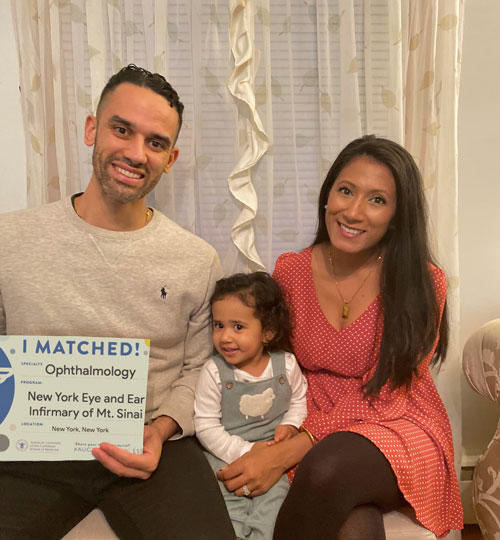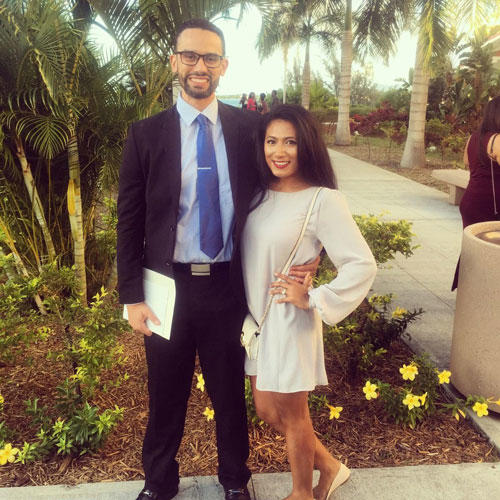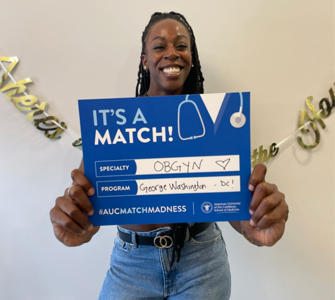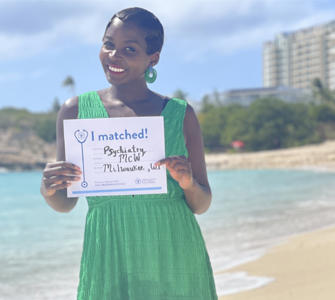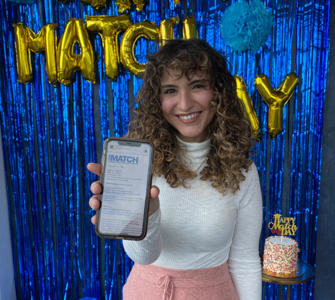His father is an ophthalmologist and Brown pursued his own research mapping out visual pathways during college at the University of Connecticut. While he kept an open mind and considered different specialties throughout medical school, he always came back to the same one.
“I love surgery, I love technology, and I love being able to see patients in the clinic and the OR over a long period of time,” says Dr. Brown, a 2020 graduate of AUC School of Medicine. “While I enjoyed bits and pieces of other specialties, ophthalmology was really the perfect fit.”
This year, Dr. Brown matched into an ophthalmology residency at New York Eye & Ear Infirmary of Mount Sinai in New York City—his first-choice residency position, and his research site for the past year.
“When we got the email, we were over the moon,” says Dr. Brown. “We ranked this program number #1, and seeing that we matched, I was almost in disbelief.”
Dr. Brown uses the term “we” when describing the residency application and matching process —a testament to how he views his residency placement as a true team effort with his wife Muna.
“I literally could not have done this without Muna,” he says. “She’s been my rock. We made every decision as a team, and we’re going to be on this crazy journey together.”
Research Experience Serves as Stepping Stone in Career Journey
Ophthalmology is a highly competitive and sought-after residency training program: In 2020, 635 students and graduates applied for the 496 ophthalmology slots offered through the San Francisco Match, and all but one was filled. Dr. Brown first applied during last year’s cycle, but didn’t match into the specialty. Afterwards, he and his wife sat down and reevaluated their next steps. Dr. Brown considered setting aside ophthalmology to pursue opportunities in surgery or internal medicine, including an unfilled position that an attending he knew recommended that he apply for.
But even though he knew it was a risk, Dr. Brown decided to stick with his chosen specialty and try for ophthalmology again the following year. He reached out to program directors he’d interviewed with to better understand the factors in their decisions, and applied for fellowship opportunities which would enable him to get more direct clinical experience in an ophthalmology program.
Ultimately, Dr. Brown landed his research position at the New York Eye & Ear Infirmary, where he had regular opportunities to go into the clinic with the principal investigator (PI), collect images, analyze data, and learn to treat different pathologies.
“My advice for anyone pursuing ophthalmology – or any specialty – is make sure that you really show up during your clinical experiences,” says Dr. Brown. “That’s the biggest question mark for interviewers. It’s easy for them to see your exam scores, but they need to understand how well prepared you are in the clinical setting. It doesn’t just have to be in the hospital, either – experiences like community service or extracurriculars help differentiate you as well.”
Making the Most of Medical School
Dr. Brown took advantage of multiple opportunities to get involved both in and outside of the classroom, starting in medical sciences. He served as president of AUC’s Student Judiciary Committee, did a rotation at the Sint Maarten Medical Center, and even teamed up with classmate Dr. Emeka Ajufo to develop a podcasting app to better utilize AUC’s lecture capture technology for students on the go.
The result, LectureKeepr, combined the recording technology of Echo360 with the functionality of a digital audio player to help make lecture recordings more accessible—including options to pause, skip back, bookmark segments of the lecture, and download so there’s no need for a Wi-Fi connection.
“Through the support of AUC, we were able to turn it into a research study and show that there was a significant difference in student performance after just one week of listening to lectures through the app. We presented at several different conferences and did a follow-up study the next year,” says Dr. Brown. “AUC really met us where we were, recognized the value in this idea, and helped us push it to see how far we could go.”
During his clinical rotations at Nassau University Medical Center (NUMC), Dr. Brown took the initiative to share his career goals and get as much experience as he could.
“I want to give a special shout-out to the NUMC ophthalmology department,” says Dr. Brown. “I walked down to the clinic where no one knew me, introduced myself and asked what I could do. They welcomed me with open arms and helped me get involved with a research project during my third year.”
Focusing on Mentorship and Community
Dr. Brown also came to regard many physicians he met during his rotations as mentors, who supported him with everything from match strategy to reviewing his personal statement.
“Having a mentor is so important—someone who is invested in your success, someone who you can be frank with, talk about your interests with. That really made a difference for me,” says Dr. Brown.
Dr. Brown participated in the Minority Ophthalmology Mentoring program, a partnership between the American Academy of Ophthalmology (AAO) and Association of University Professors of Ophthalmology (AUPO). The program’s goal is to increase diversity in the specialty by helping students underrepresented in medicine (URiM) become competitive ophthalmology residency applicants. According to the program, underrepresented minority groups comprise 30.7% of the U.S. population but only make up 6% of practicing ophthalmologists.
Dr. Brown, who is of Black, Native American, and Irish descent, recommends students look into whether their specialty of choice has a similar program available. “The Minority Ophthalmology Mentoring program provided me with mentors who shared tools for success with me, and it’s really valuable to be part of a group like this where everyone is working towards the same goal,” says Dr. Brown.
He’s also strived to pay it forward and share the perspective he’s gained with the next generation of physicians. Since graduating, Dr. Brown has served as a Clinical Education Fellow at AUC as well as a member of AUC’s Racial Equality and Social Justice Taskforce.
“As doctors, we’re leaders in the community, and if we are all more cognizant about issues of unequal treatment and access to healthcare, that will make us better clinicians,” says Dr. Brown.
His interest in improving healthcare disparities and expanding access was also a key factor in choosing New York Eye & Ear Infirmary for his training.
“New York Eye & Ear Infirmary has an incredible history of providing care to underserved populations,” says Dr. Brown. “It’s the first specialty eye hospital in the US, and since the beginning they’ve provided vision care to people who are uninsured. And, it’s home to so many distinguished faculty and attendings who are active in research—it’s a great place to learn.”
Advice for The Match
Dr. Brown credits his support network with helping him get to where he is today, and advises current students to focus on taking care of themselves amid the challenges of medical school.
“I’ve had such a strong support system—my wife, who is there for me 24/7, friends that inspired me to work hard, a school where I felt supported, and professors who cared and were committed to my success,” says Dr. Brown. “I would encourage people to prioritize their family and their wellbeing, because medical school is very difficult and stressful. It’s important to take care of your mental and physical health – you have to make sure you finish strong internally.”
He also emphasizes the value of networking and encourages students not to let their nerves get the best of them when meeting physicians in their specialty of choice.
“Go to conferences, join regional specialty groups, try cold emailing someone who you want to learn from or talking to an attending in your hospital,” said Dr. Brown. “That’s something that I was hesitant to do at first. You will strike out and have awkward moments—it’s trial and error—but the truth is, they’re people who are also passionate about their field, and people like to talk about things that excite them. Don’t be intimidated just because someone is a big name.”
He now looks forward to taking the next step in his career and continuing to make his dream job into a reality.
“AUC gave me a chance to be a doctor,” says Dr. Brown. “That chance has blossomed into what looks like a very promising career in the specialty that I love.”


